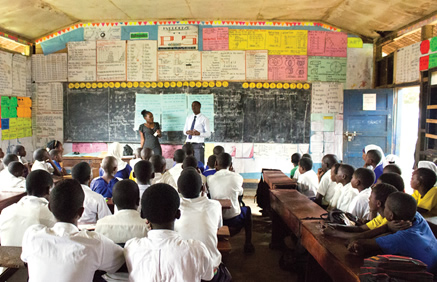 Dr. Semakula is the Innovations and Knowledge Translation Officer at MakCHS. Prof. Sewankambo and Dr. Semakula are supported by the WT and AESA through the DELTAS grant to do public engagement at MakCHS and within the THRiVE consortium. Under the Informed Health Choices project funded by the Research Council of Norway they are developing and evaluating teaching resources to help the lay public recognise and assess the trustworthiness of claims people make about the benefits and harms of treatments. Daniel’s work is supervised by Prof. Sewankambo, Director THRiVE. The contribution of WT and AESA was acknowledged in the two Lancet papers.
Dr. Semakula is the Innovations and Knowledge Translation Officer at MakCHS. Prof. Sewankambo and Dr. Semakula are supported by the WT and AESA through the DELTAS grant to do public engagement at MakCHS and within the THRiVE consortium. Under the Informed Health Choices project funded by the Research Council of Norway they are developing and evaluating teaching resources to help the lay public recognise and assess the trustworthiness of claims people make about the benefits and harms of treatments. Daniel’s work is supervised by Prof. Sewankambo, Director THRiVE. The contribution of WT and AESA was acknowledged in the two Lancet papers.
Context and importance of this work:
There are many unproven claims about what we need to do to improve our health. People who make decisions based on wrong claims about treatments of any type, are prone to making bad health choices and may experience poor health outcomes. Some of the assumptions underlying such claims are deep-rooted in culture but the researchers (in another paper accessible here) identified many more wrong assumptions upon which people base their claims. The researchers developed their interventions to address those false assumptions underlying claims, and enhance critical thinking and application of key concepts necessary for people to understand if they are to be able to assess the trustworthiness of treatment claims. The general lack of critical thinking skills among the populace, the unregulated health-related information in the media, the internet and social media have amplified the platform for sharing fake information, some of which people wrongly perceive as truths. In this information age we are all prone to misinformation, but even more prone are people with inadequate aptitude to critically appraise health information. It is therefore important for people to be equipped with skills to assess the trustworthiness of health information and to be able to make appropriate and informed health choices. This research was also interesting because resources developed in Uganda for low income countries were also found to be relevant, usable and acceptable to children in Norway.
The research results have been launched at the Royal College of Pediatric and Child Health in London at a colorful event hosted by the Education Endowment Fund of the UK, The Norwegian Research Council, The Royal College of Pediatrics and Child Health-UK, The James Lind Initiative, and the Lancet Publications, and was attended by over 70 research leaders in education and health from across Europe and Africa.
